Elana Rosenbaum – 3 Day: Integrating MBSR into Your Clinical Practice
$600 Original price was: $600.$113Current price is: $113.
Shopping Instructions:
- DISCOUNT 15% : SHOP15
- Product Delivery: Within 1 – 12 hours after purchase.
Elana Rosenbaum – 3 Day: Integrating MBSR into Your Clinical Practice
Sale Page : -/-
Description:
Positive client outcomes are what we all strive for. Yet, over time, we can begin to feel stuck in a rut. The same treatments and methods we’ve become accustomed to using can start to show their limitations (and create burn-out).
A way to break through with your clients can be found within a well-researched method for teaching mindfulness called MBSR (Mindfulness-Based Stress Reduction). MBSR is clinically shown to have profound benefits on emotional and physical well-being as well as a wide range of chronic conditions.
MBSR-informed adaptations are now used for the basis for many interventions, including treatment for depression, anxiety, trauma, addiction, ADHD and pain.
Watch this 3-day course recording and you’ll be immersed into an experiential workshop that will introduce and deepen mindfulness-based practices for clinicians and explore how these can be conveyed in a broad variety of populations and settings.
You’ll be nourished as you learn transformational mindfulness techniques and gain an in-depth knowledge of the MBSR program and all its benefits. The slogan of an MBSR approach is “There’s more right with you than wrong.” Come and experience how this is true.
Sign up today and learn how to embody and apply mindfulness to your patient population simply but effectively. Be renewed while getting a whole new toolbox of techniques for treating trauma, anxiety, chronic pain, depression, addictions, ADHD and more!
Handouts
| Manual – 3-Day Integrating MBSR into Your Clinical Practice (23.4 MB) | 131 Pages | Available after Purchase |
Outline
What is Mindfulness?
- Core Principles
- Application in the MBSR Curriculum
- Universality and Adaptability (to specific populations and conditions)
- Research on its Benefits
- Limitations of Research and Possible Risks
What is MBSR and How it Works
- Why MBSR was Created and the Evidence of Improved Outcomes
- What MBSR Works Best for
- MBSR Ground Rules and Fundamental Beliefs
- Establishing a Culture of Safety, Connection and Commonality
- How to assess if an MBSR Approach is Right for Your Client
Formal Mindfulness Practices: Guided Experiential Sessions-Practice the Techniques and then Debrief through Mindful Inquiry
- The Body Scan
- The Sitting Meditation with Awareness of Breath
- The Sitting Meditation with Sound, Sensation, Feelings, Thoughts and Open Awareness
- Mindful Movement and Yoga
- Adaptations to Yoga
- Walking Meditation
- Loving-Kindness Meditation
Informal Mindfulness Practices: Practice Interventions Clients Can Use in Daily Life in Minutes or Less
- The S.T.O.P. Technique
- The Three Step Breathing Space
- One Moment Meditation
- Urge Surfing
- The R.A.I.N. Technique
- Creating Home Practices
- Mindfulness Cues
The MBSR Curriculum: Experiential Learning: Making Practice Practical
- The Sequence and Themes of the MBSR Sessions
- Class 1-3 – Grounding Mindfulness in the Body
- Class 4-5 – Stress Reduction versus Response
- Class 6-7 – Communication and Interpersonal Mindfulness
- Class 8 – Summation and Bringing Mindfulness Home
- Establishing Goals and Expectations for Your Clients
- The Use of Language
- The Power of Intention
- Anchoring and Sustaining Attention
- The Process of Mindful Inquiry – An Underutilized Tool
- Home Practices, Reinforcing Mindfulness
- Communication Strategies with Clients
- Inter-Personal Mindfulness Strategies and Techniques
Emotion Regulation
- Perception: The Lens of Experience
- The Role of Arousal: Stress Reaction vs. Response
- Working with Thoughts
- Working with Feelings: Pleasant and Unpleasant
- Cultivating Acceptance
- The Use of Compassion
- Identify Habitual and Conditioned Reactions to Anxiety, Chronic Pain, and Depression
- Obstacles
- Application of Neuro-Science Research
Practice in Introducing Mindfulness and MBSR-Informed Adaptations
- Adaptations for Groups vs Individuals
- Adaptations Specific for Children & Adolescents vs. Adults
- Trauma Sensitive Mindfulness
- The Four R’s
- Supporting Safety and Stability
- The Window of Tolerance
- Symptom Specific Adaptations for:
- Anxiety & Stress
- Chronic Pain
- Depression
- Addictions
- PTSDs
The Therapist as the Vehicle of Change
- Embodiment: The Power of Presence
- Communication: Verbal and Non-Verbal
- The Use of Language
- The Use of Movement
- Personal Practice-Taking Mindfulness Home
Faculty
Elana Rosenbaum, MS, LICSWRelated seminars and products:5
Senior Teacher. Mindfulness Coach
Elana Rosenbaum, MS, LICSW, has been integrating mindfulness with psychotherapy for over 30 years. She is a leader in the clinical application of mindfulness meditation to cancer care and is a pioneering teacher of Mindfulness-Based Stress Reduction at the Center for Mindfulness, the University of Massachusetts Medical School. She is the author of The Heart of Mindfulness-Based Stress Reduction: A MBSR Guide for Clinicians and Clients (PESI, 2017), Here for Now: Living Well with Cancer through Mindfulness (Satya House Publications, 2007) and Being Well (even when you’re sick): Mindfulness Practices for People Living With Cancer and Other Serious Illness (Shambhala, 2012).
Elana has a private practice in psychotherapy in Worcester, Massachusetts and is a sought after mindfulness coach, teacher, speaker, workshop leader, and research consultant. She has been featured in “Chronicle” on CBS and mentioned in many magazine articles including Yoga Journal, Health, Coping, and the PBS audio series, “Walking through the Storm”. She is currently working on another book, a workbook of mindfulness exercises for optimal living.
Speaker Disclosures:
Financial: Elana Rosenbaum maintains a private practice. She receives royalties as an author for Shambhala and Satya House Publications. Ms. Rosenbaum receives a speaking honorarium from PESI, Inc.
Nonfinancial: Elana Rosenbaum has no relevant nonfinancial relationship to disclose.
Find out more Personal Development Courses at here !!!
1 review for Elana Rosenbaum – 3 Day: Integrating MBSR into Your Clinical Practice
Add a review Cancel reply
Related products
HEALTH & MEDICAL
HEALTH & MEDICAL
HEALTH & MEDICAL
HEALTH & MEDICAL
HEALTH & MEDICAL

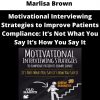
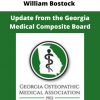
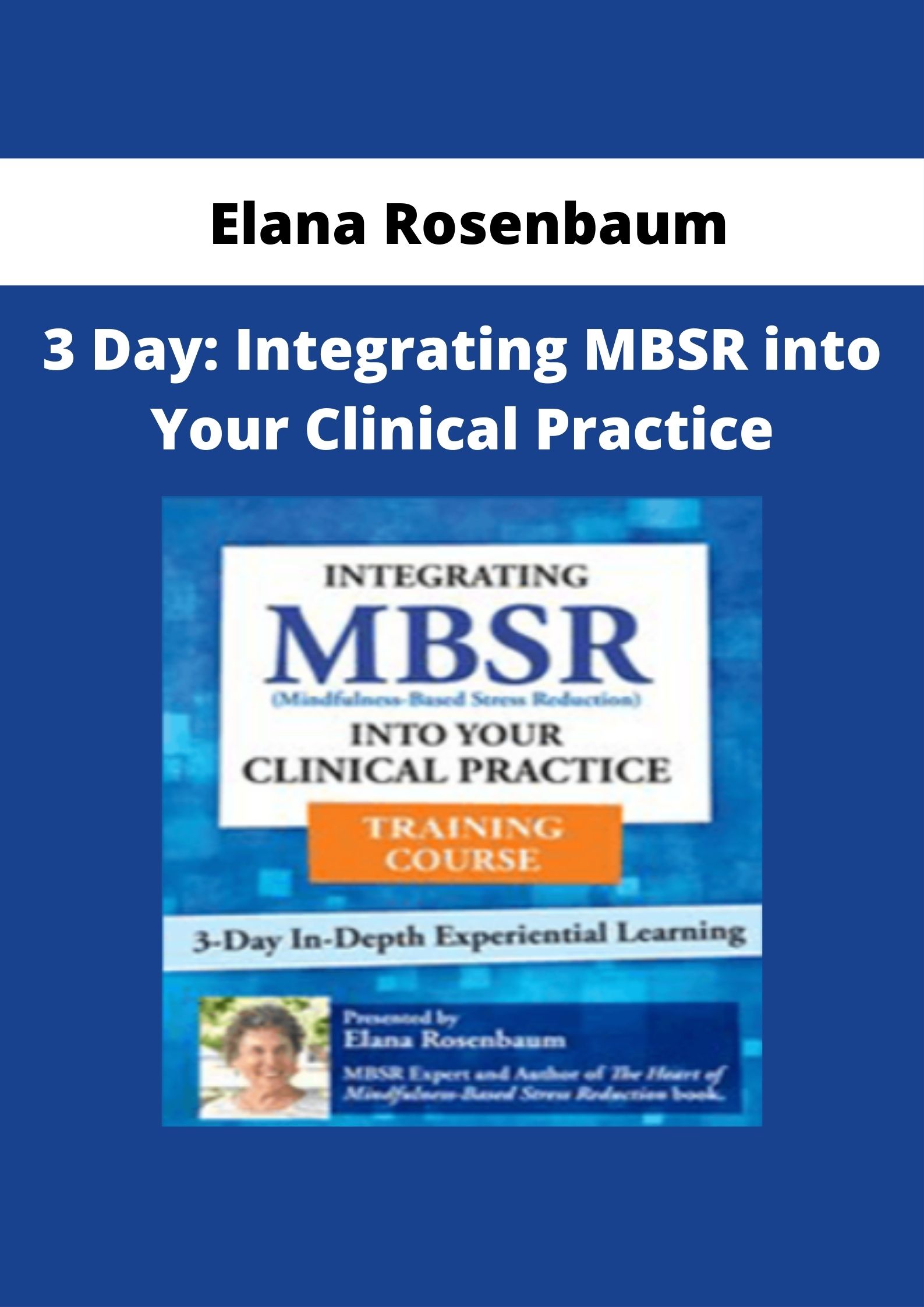

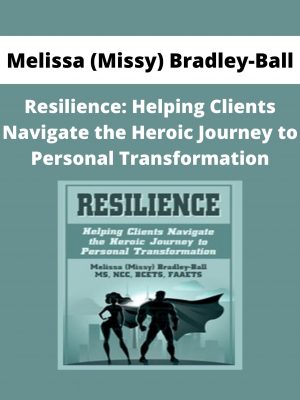
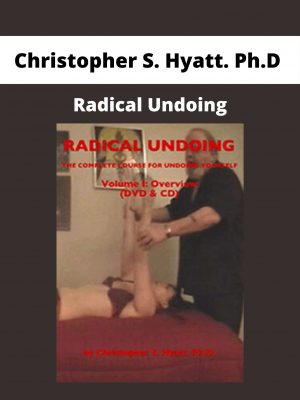
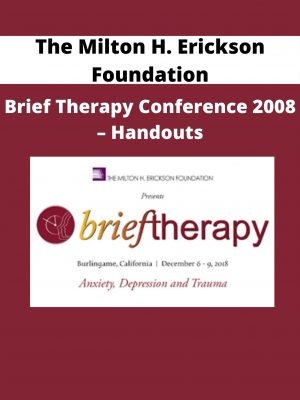

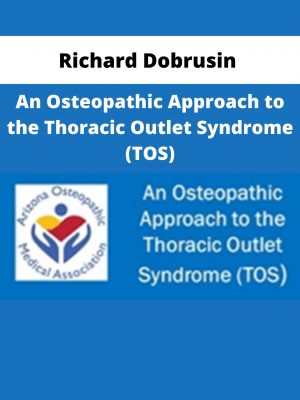


Citlalli Fritsch Jr. –
Amazing, received fast | Elana Rosenbaum – 3 Day: Integrating MBSR into Your Clinical Practice